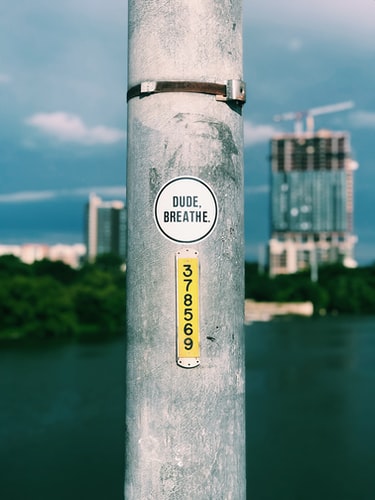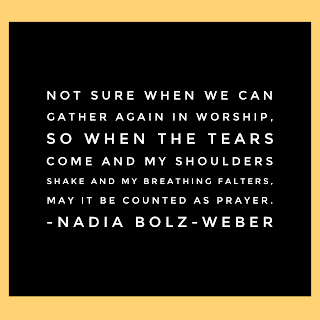Breadth, bread, breath of life
Genesis 1: 26-31; 2: 1-4a
New Ark United Church of Christ, Newark, DE
June 7, 2020 - Trinity Sunday
How many of us think about breathing on any given day? Unless we have difficulty breathing, most of us take it for granted. Meditation is nothing more and nothing less than giving our minds a rest by focusing on our breathing. When we center our attention on the breath, we are brought into the present moment. Buddhist monk Thich Nhat Hanh teaches this mantra: “Breathing in, I calm my body. Breathing out, I smile. Dwelling in the present moment, I know this is a wonderful moment.”
There is so much that pulls us out of the present moment and distracts us from what is happening here and now. And yet some of us need to busy ourselves because we can’t concentrate when we’re still; others of us have difficulty with so much silence. And for some that present moment isn’t so wonderful because of grief or anxiety or pain. Sometimes that present moment is a build-up from years of trauma, discrimination, addiction, anger, and it’s hard to let go. That present moment can be a lonely one and it only leads to another. And yet we all need a way to move from one moment to the next, to make a path to a space in which we can breathe. It’s how we soothe ourselves, how we heal ourselves. When we can breathe deeply, peacefully, calmly, we can create a moment in which we are whole, if only for that moment. And from there, yet another moment is possible, and an opportunity, an outcome we had not yet imagined for ourselves.
So by the very act of breathing we are evolving, we are creating. We are creating space. We’re literally expanding the space in our lungs and in our chest and abdomen. But we’re also creating space for a discovery, an idea, a new way of being, for renewal of spirit. We’re breathing with everything that has the breath of life. American theologian Sallie McFague imagined that God not only breathes life into all of creation but breathes through creation, that the whole universe is the body of God. The Jewish name for G-d, YHWH, is pronounced like the sounds we make as we inhale and exhale: yah-weh. A well-known Midrash says that the first thing and the last thing in life is the same: it is the breath. If we are blessed to live 80 or so years, if we are privileged, we will have taken over 670 million breaths and so we can’t afford to take them for granted, because they are indeed numbered. Every breath is a resurrection, replenishing our bodies, every nook and cranny, with air that cleanses and releases stress.
And yet we are painfully aware that not all bodies are equal; not all of us can breathe freely. People in hospitals on ventilators. Black and brown lives with knees on their necks. Eric Garner. George Floyd. Black and brown bodies that have had the breath of life violently taken from them. The words “I can’t breathe” starkly testify that racism is a public health crisis. Yesterday in front of the Newark Police Department several hundred people knelt and sat in the hot sun in silence for 8 minutes and 46 seconds, and it was moment of Communion unlike any I’ve ever experienced. And yet it was only a taste—a tiny, risk-free taste. Our bodies were the bread. Our masks were the chalice that held that sacred ruach, the breath of life. Our breath was the stuff of life poured out, not for the forgiveness of sins but for the beginning of repentance.
These protests are about grief as much as anything else. The work of grief is shared work. We can’t create space for new life without also tending to loss and death and acknowledging what needs to end. For too long our grief has been segregated and we’ve become desensitized to so much death. It may seem like we are all chambers of the same heart but my heart does not know the anguish of being a Black or brown or Indigenous mother in this country. I don’t know what it’s like to hold my breath as I call 9-1-1, whether I can trust who will show up. I don’t know what it’s like to have my breath catch in the back of my throat, choked by sobs at yet another senseless death because of the shared color of skin.
Truthout writer Kelly Hayes says that we need “a riot of empathy”. We need to invest ourselves in someone else’s pain, our collective pain rather than engage in the sport of competitive victimhood. Maybe it all feels overwhelming because we haven’t had to live with it every day of our lives the way people of color have to, have had to for generations. And yet our highest ideals haven’t motivated us enough to change. Perhaps our pain will.
New Ark United Church of Christ, Newark, DE
June 7, 2020 - Trinity Sunday
There is so much that pulls us out of the present moment and distracts us from what is happening here and now. And yet some of us need to busy ourselves because we can’t concentrate when we’re still; others of us have difficulty with so much silence. And for some that present moment isn’t so wonderful because of grief or anxiety or pain. Sometimes that present moment is a build-up from years of trauma, discrimination, addiction, anger, and it’s hard to let go. That present moment can be a lonely one and it only leads to another. And yet we all need a way to move from one moment to the next, to make a path to a space in which we can breathe. It’s how we soothe ourselves, how we heal ourselves. When we can breathe deeply, peacefully, calmly, we can create a moment in which we are whole, if only for that moment. And from there, yet another moment is possible, and an opportunity, an outcome we had not yet imagined for ourselves.
So by the very act of breathing we are evolving, we are creating. We are creating space. We’re literally expanding the space in our lungs and in our chest and abdomen. But we’re also creating space for a discovery, an idea, a new way of being, for renewal of spirit. We’re breathing with everything that has the breath of life. American theologian Sallie McFague imagined that God not only breathes life into all of creation but breathes through creation, that the whole universe is the body of God. The Jewish name for G-d, YHWH, is pronounced like the sounds we make as we inhale and exhale: yah-weh. A well-known Midrash says that the first thing and the last thing in life is the same: it is the breath. If we are blessed to live 80 or so years, if we are privileged, we will have taken over 670 million breaths and so we can’t afford to take them for granted, because they are indeed numbered. Every breath is a resurrection, replenishing our bodies, every nook and cranny, with air that cleanses and releases stress.
And yet we are painfully aware that not all bodies are equal; not all of us can breathe freely. People in hospitals on ventilators. Black and brown lives with knees on their necks. Eric Garner. George Floyd. Black and brown bodies that have had the breath of life violently taken from them. The words “I can’t breathe” starkly testify that racism is a public health crisis. Yesterday in front of the Newark Police Department several hundred people knelt and sat in the hot sun in silence for 8 minutes and 46 seconds, and it was moment of Communion unlike any I’ve ever experienced. And yet it was only a taste—a tiny, risk-free taste. Our bodies were the bread. Our masks were the chalice that held that sacred ruach, the breath of life. Our breath was the stuff of life poured out, not for the forgiveness of sins but for the beginning of repentance.
These protests are about grief as much as anything else. The work of grief is shared work. We can’t create space for new life without also tending to loss and death and acknowledging what needs to end. For too long our grief has been segregated and we’ve become desensitized to so much death. It may seem like we are all chambers of the same heart but my heart does not know the anguish of being a Black or brown or Indigenous mother in this country. I don’t know what it’s like to hold my breath as I call 9-1-1, whether I can trust who will show up. I don’t know what it’s like to have my breath catch in the back of my throat, choked by sobs at yet another senseless death because of the shared color of skin.
Truthout writer Kelly Hayes says that we need “a riot of empathy”. We need to invest ourselves in someone else’s pain, our collective pain rather than engage in the sport of competitive victimhood. Maybe it all feels overwhelming because we haven’t had to live with it every day of our lives the way people of color have to, have had to for generations. And yet our highest ideals haven’t motivated us enough to change. Perhaps our pain will.
Recently I heard a suggestion that as we pray during this pandemic, we pray “Give us this day our daily breath”. I not only pray that my Black and brown and Indigenous siblings have their daily breath, but that they can breathe, that I would do what is necessary that they have whatever they need so they can actually have their 670 million breaths without one knee whatsoever.









Comments
Post a Comment